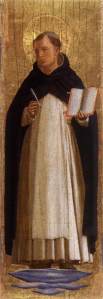If you’re a Catholic or scholastic Protestant thinker, you’ll follow along with Erich Przywara’s dictum (following Thomas’) of ‘revelation perfecting revelation.’ You’ll see a continuity between the naked philosopher’s machinations, and what comes in perfection through God’s Self-revelation in Jesus Christ. You’ll maintain that humanity, since it is born into an  iteration of God’s grace (which is an abstract creation), has the capacity, albeit, finite, to think towards the God of creation. On the other hand, if you’re a genuinely Protestant thinker who takes the noetic effects of the fall, who takes total depravity seriously, and who does not sublate such teaching with a Thomist intellectualist anthropology, you’ll be like Karl Barth and repudiate something like Przywara’s analogia entis.
iteration of God’s grace (which is an abstract creation), has the capacity, albeit, finite, to think towards the God of creation. On the other hand, if you’re a genuinely Protestant thinker who takes the noetic effects of the fall, who takes total depravity seriously, and who does not sublate such teaching with a Thomist intellectualist anthropology, you’ll be like Karl Barth and repudiate something like Przywara’s analogia entis.
In other words, Barth sees the same ‘prefix’ that condemned in ‘The Holy Spirit and the Christian Life’ operative within Przywara’s Analogia Entis. Przywara posits that insights gained apart from God’s revelation of Jesus Christ stand in continuity with those acquired in and through this revelation because the ‘nature’ that philosophers are examining is, in fact, within the realm of grace simply as a result of God’s act of creation. Here lies the problem. Barth believes that this account overlooks the effects of the human sin. In his view, God’s act in creation cannot lead to true knowledge of God because creation is fallen. If nature stands in continuity with grace, therefore, it can do so solely because of the justifying work of Jesus Christ. This means that any relationship with God, or any true knowledge of God, stems solely from the knowledge of our justification. This is where we must start. Knowledge obtained from sources other than this starting point in Jesus Christ — such as the knowledge gained by the philosophers — does not stand in continuity with the knowledge of God given in and through Christ. The revelation of Jesus Christ, rather, comes from the outside as something new and distinct, and it stands in judgement over all other sources for the knowledge of God.1
We currently have a bunch of scholastic Reformed theologians telling their students, and anyone who will listen, to recover Thomas Aquinas’ way of ‘grace perfecting nature.’ And yet this is at precise crosspurposes with Luther’s reformational move of solafidian. Barth understands the original intention and implications of Luther’s reformation, the scholastics Reformed remain clueless here. If you claim to be a committed Protestant who affirms an actual fall, with all of its ontological and noetic implications, then you ought to repudiate the natural theology of the Catholics, and scholastics Reformed. The scholastics Reformed only re-appropriated the Catholic mode of theological epistemology, and its prior doctrine of creation; they do not operate as genuine Protestant thinkers. Just because that’s ‘part’ of the Reformed heritage, ie the scholastics Reformed, does not make it the orthodox Protestantism that ought to be redivivus; but that is the driving supposition behind this particular recovery movement.
1 Keith L. Johnson, Karl Barth and the Analogia Entis (New York: T&T Clark, 2010), 149.
